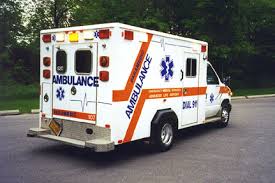“All’s well that ends well,” declared Shakespeare in about 1605. Six weeks ago Tuesday, when I returned home from the local Emergency Department, I was inclined agree.
All might not have been well, however, without the ministrations of Emergency Medical Technicians (EMTs) from the Madison Fire Department and the cool-headed competence of a 911 operator. I am told that a fire truck, a police car, and an ambulance all showed up at my house, although I never saw the fire truck. Parked as it was immediately in front of the house, it somehow escaped my notice.
I remember seeing the fireman, the policeman, and a number of EMTs. I don’t know any of their names. I couldn’t even tell you exactly how many there were. Such was the state of my consciousness.
I do remember their focused and efficient care. A wonderful, warm-hearted, and terribly concerned fireman (thick-set and very good-looking too, although that was completely irrelevant) started proceedings by asking me if I knew my name. When they had ascertained that I had sustained no head injuries, two of them carried me from the top of the stairs to a spot near the bottom where I could sit as they worked. One EMT, a woman, continued asking questions from my left as she took my blood pressure (something ridiculously low, along the lines of 67/40) and other vital signs. On my right, a man worked swiftly and in near silence to measure an instant blood glucose level from a fingerstick.
This continued for probably five or six minutes. My ability to measure time was compromised.
While awaiting the EMTs’ arrival from a seat at the top of the stairs, I had heard a rush of white noise in my ears. By the time I reached the bottom of the stairs, the white noise had abated, but my view of the scene was breaking up, as though I were seeing everything reflected in a shattered mirror. It seemed that my brain could not assemble a complete visual picture and had to settle for a collection of discrete sections divided by pale, wavy boundary lines. I decided that my most important – and perhaps only – job was to maintain consciousness. Toward that end I devoted all of my energy, so I never saw the fire truck.
Two strong men strapped me into a chair and carried me down the front steps to a gurney waiting at the top of the driveway. They pushed me on the gurney down the at-times-inconveniently steep driveway and loaded me into the back of the waiting ambulance, where the competent and confidence-inspiring lady EMT started me on a bag of intravenous fluids. I asked whether she could do anything for some pain and nausea. She said no about the pain but gave me an IV push drug that stopped the nausea almost immediately. After she had called ahead to alert the Emergency Room of our imminent arrival, we departed. I had never realized how bumpy my street was before riding over it while lying on my back.
Later, my mother asked whether I had noticed the three neighbors on the next-door driveway watching as the ambulance loaded and left. I replied that I hadn’t even noticed the next-door driveway.
The Emergency Department physicians and staff were terrific. Excellent bedside manner was the rule of the day. Three hours later I was back home with normal vital signs, no new medical problems, and notes about how to make sure the crazy events of that afternoon would never recur.
All of the drama had come about because of blood loss and some very poor judgment on my part, most likely as a consequence of the blood loss. One lesson I draw from the whole affair is that someone under the influence of heatstroke, blood loss, or dehydration cannot be trusted to make sound decisions.
I knew on that Tuesday morning that something was wrong. I should have gone to pains to replenish fluids but did not, so I became, unwittingly, quite dehydrated. In the early afternoon, I decided to see a doctor but wanted to grab a quick shower first. That turned out to be a mistake.
I had at times in the past been lightheaded in a shower, but never as badly as this. I turned off the water and stuck my head into cooler room air in an unsuccessful attempt to catch my breath. At about this time I decided that although a bathroom floor isn’t normally a salubrious resting place, a lie-down on the floor was very appealing. Then followed waves of nausea. My mother knocked on the door in alarm. “Are you all right? Should I call an ambulance?”
“I don’t need an ambulance,” I slurred defiantly, my judgment completely gone.
I felt a great need to get ready to see the doctor, but I was literally too weak to dry off. So I sat for a couple of minutes before attempting to stand.
I realized before long that I had been dreaming and decided that I must have put my head down for a moment. Gradually I became aware of my mother’s voice. She was on the phone with a 911 operator.
“Please don’t call them now,” I thought, “I can’t possibly be ready before they arrive!”
“Cynthia, stay down,” my mother called, but all I could think of (judgment still gone) was wanting to be ready to meet the ambulance crew. I defied my mother’s eminently sensible advice and started to move.
“You can wear a robe!” my mother called.
“A robe,” I thought, “Great idea!” It never occurred to me to wait for my mother to fetch it for me.
Off I lumbered into my room, which is fortunately carpeted and devoid of sharp furniture. After an immeasurable passage of time, I again became aware that my mind had been transported to an altered state.
I came too, stood, and chuckled at what had transpired. “I think I passed out,” I declared with a laugh. A burst of euphoric energy carried me to the top of the staircase, where I needed to sit again, and where the rushing sound started in my ears. I noted the arrival of the emergency crews as though it were happening in a movie. All of it ceased to be funny.
I had fainted twice, the first time in the bathroom with my mother downstairs. She later said that I had sounded like a large sack of potatoes spilling onto the ground. The second time I fainted was onto the carpet in my room. My mother saw that happen and said I had collapsed straight down like a rag doll.
Somehow I had managed not to strike anything on the way down.
My energy level returned to normal after about ten days. I know what to do to prevent a recurrence of the fainting. I can safely consign that unpleasant episode into the past, but I keep thinking about the First Responders I met that day.
Every face I saw that afternoon was a portrait of concern. (It is quite an experience to meet a group of strangers and have each of them scrutinize at one with deep concern.)
To a man or woman, everyone was calm, determined, and focused on the tasks at hand. They worked together like components of a machine. There were no wasted words.
They were a team completely dedicated for that moment to one job – the preservation of my life. They do this again and again, day after day, for people they don’t know and the outcomes of whose stories they might never hear.
I wish I could let those First Responders know that everything here turned out OK. I would like to thank them, all five or six or seven of them – however many there were, from the bottom of my heart.
Quotes for Today
I am in blood
Stepp’d in so far that, should I wade no more,
Returning were as tedious as go o’er: — MacBeth in MacBeth, Act III, Scene 4
If thou wouldst fain feint with fate, i’ faith, feign a faint. – Anonymous


Dear Cynthia, A remarkable account. I hope some of the First Responders see this narrative. It is so appreciative. Marie
LikeLiked by 1 person
Dear Cynthia, I did not know you have been in health troubles, but I am very happy to know that now you are well!!!
LikeLiked by 1 person